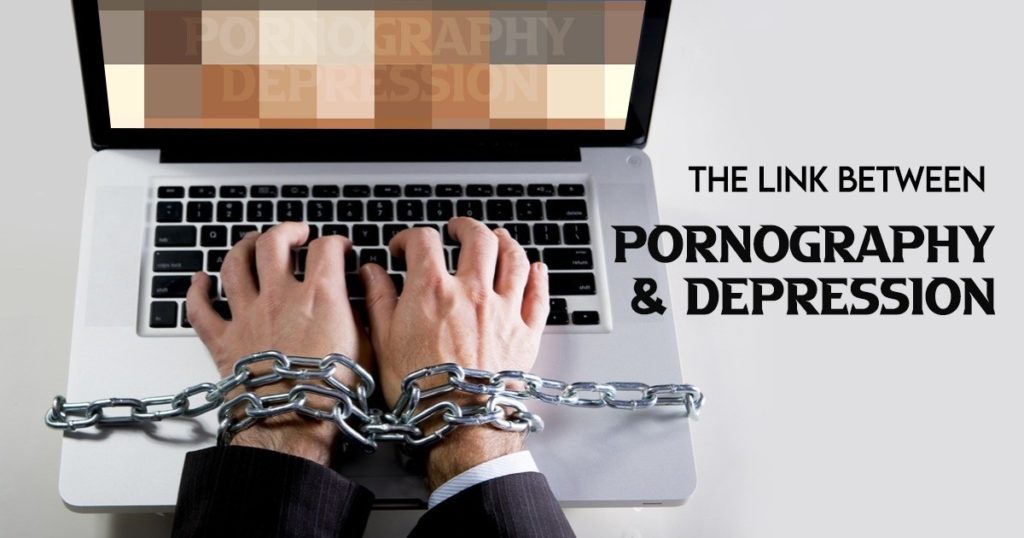Pornography is incredibly available and pervasive in our modern, tech-driven society.
But, we increasingly see that porn addiction may have harmful effects, including depressive symptoms.
For example, researchers are discovering the link between pornography and depression, as well as other adverse consequences.
Below are some specific things to know about the association between pornography and depression, and other associated mental health concerns.
The Relationship Between Pornography and Depression
A theory sometimes circulated that there is a relationship between pornography and depression.
Currently, there are no specific research studies to support that idea.
In a 2017 study of self-reported experiences, male students who viewed porn several times a week said they experienced depression at a five times higher rate than individuals using it less than once a week.
In 2019, a study that did show too much pornography could potentially increase the risk of depression in men and women.
Saying that something increases the risk does have to be separated from a cause, though.
People may become depressed from watching pornography because they use it as a way to isolate themselves from genuine relationships.
If you don’t have social support, you are at greater risk for depression and other psychological distress.
The more you use pornography, the more your brain becomes dependent on it for the release of dopamine. Without that artificial dopamine spike, it could be challenging to feel pleasure naturally in other areas of your life.
Pornography is very stimulating sexual behavior, and that undoubtedly affects the chemistry of the brain.
There’s another possible link between depression and porn: having pre-existing depression can increase the risk of developing an unhealthy relationship with pornography or sex addiction.
When used as a coping mechanism, people with depression retreat into a world dominated by pornography.
Perhaps to avoid real-world interactions or to compensate for a lack of relationship satisfaction.
In these situations, pornography becomes a way to self-medicate.
Symptoms of depression and temporarily feel better but makes their situation worse in the long term.
Suppose someone has moral disapproval of the sex industry or they feel guilty about their pornography habits, they may be at an even greater risk of developing mental health disorders like depression when they do view it.
Mental Health Center of San Diego
How Pornography Affects the Brain
Around one-quarter of all online searches related to sex, highlighting the demand and overall accessibility of pornography to the average person today.
Researchers have found changes in the brain when viewing porn, specifically, the release of dopamine, which is a brain chemical that’s also released when someone uses drugs or other psychoactive substances.
Risk factors depend on your usage of porn and your genetic predisposition for mental disorders.
For example, some people may view pornography occasionally, and have no problem doing so in moderation; but porn addiction may become compulsive for others.
Signs of potentially problematic pornography habits include:
- Affecting school, work, or sex life
- Watching porn to fulfill a need, rather than for pleasure
- Using it for emotional comfort
- Experiencing distress or guilt for watching porn
- Difficulty resisting the urge to watch porn
What Does Depression Feel Like?
In many cases, people suffering from depression don’t even realize they are depressed.
There is a general conceived notion of what depression looks like, meanwhile, there is a wide spectrum of levels of depression, and the ways they manifest themselves.
Some depressive symptoms include:
- Loss of joy or pleasure in life
- Loss of interest hobbies
- Feeling tired all the time
- Problems with focus and concentration
- Brain fog
- Problems making decisions
- Feelings of hopelessness or worthlessness
- Problems falling asleep or sleeping too much
- Physical pain like body aches and headaches
- Irritability
- Withdrawal from social activities
- Changes in energy levels
Mental Health Center of San Diego
Do I have a Pornography Addiction?
Along with the conversation of pornography and depression comes the question of whether or not you can have an addiction to pornography.
It’s controversial, and some therapists acknowledge associations between pornography and addiction, while others don’t think it is a mental health condition.
Many mental health professionals believe that internet pornography consumption isn’t inherently harmful, but the relationship a person has with porn can become a problem.
Addiction changes the brain and body.
It leads someone to compulsively continue doing a particular activity or taking a substance even when it’s harmful to do so.
As was mentioned, when you view pornography, your brain responds with the release of dopamine.
Dopamine makes you feel good briefly, but your brain also remembers how your body released dopamine because your brain wants to repeat the rewarding behavior.
The effects of porn can potentially affect your brain, the same drugs and alcohol, by taking over your natural reward system.
Each time you repeat a behavior, including watching pornography, your brain might reduce less dopamine.
Then, you might start to view it for more extended periods, view it more frequently, or view more taboo or extreme types of pornography to keep up the dopamine levels.
This is the same pattern that occurs when someone becomes addicted to drugs or alcohol.
The Effects of Pornography on Relationships
Another reason that there’s the potential for a connection between pornography and depression is the toll it can take on personal relationships.
A primary factor against developing depressive symptoms is social connections and relationships.
However, pornography can cause issues with relationship satisfaction for both sides of the relationship.
Porn addiction may cause mental health issues, moral incongruence, decreased sexual desire, or even the inability to have an orgasm during sexual activities.
Porn users may also develop unrealistic expectations that put a strain on relationships.
Mental Health Center of San Diego
The Takeaway
There is some evidence that currently shows there are links between pornography and depression.
These come primarily from studies where people self-report their symptoms, which doesn’t necessarily mean that pornography causes depression or vice versa.
We don’t have any clear professional determinations yet.
However, it is clear that there is a complex relationship linking pornography and depressive symptoms.
Porn users may be at a higher risk of developing depression, and someone with depression could be more susceptible to having a problematic relationship with pornography.
Most mental health experts agree that moderate porn consumption isn’t necessarily a problem.
Still, because of the effects on the brain, relationships, and lifestyle, it can create issues in someone’s life; it may also have effects similar to other addictions.
If you are experiencing depressive symptoms of depression or that pornography is creating problems in your life.
In that case, the Mental Health Center of San Diego has many trained therapists and professionals who will discuss your situation and guide you in the direction that will help you feel mentally healthy and happy again.









